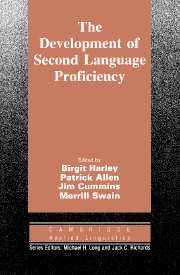Book contents
- Frontmatter
- Contents
- List of contributors
- Series editors' preface
- Acknowledgments
- Introduction
- I THE NATURE OF LANGUAGE PROFICIENCY
- Chapter 1 The nature of language proficiency
- Chapter 2 Constructing measures and measuring constructs
- Chapter 3 Communicative competence revisited
- Chapter 4 Response by DBP project members to the discussion papers of Lyle Bachman and Jacquelyn Schachter
- II CLASSROOM TREATMENT
- III SOCIAL AND INDIVIDUAL VARIABLES
- IV PRACTICAL AND POLICY IMPLICATIONS
- V THIRTY-FIVE YEARS OF RESEARCH ON BILINGUALISM
- CONCLUSION
- References
- Author Index
- Subject Index
Chapter 3 - Communicative competence revisited
Published online by Cambridge University Press: 05 October 2012
- Frontmatter
- Contents
- List of contributors
- Series editors' preface
- Acknowledgments
- Introduction
- I THE NATURE OF LANGUAGE PROFICIENCY
- Chapter 1 The nature of language proficiency
- Chapter 2 Constructing measures and measuring constructs
- Chapter 3 Communicative competence revisited
- Chapter 4 Response by DBP project members to the discussion papers of Lyle Bachman and Jacquelyn Schachter
- II CLASSROOM TREATMENT
- III SOCIAL AND INDIVIDUAL VARIABLES
- IV PRACTICAL AND POLICY IMPLICATIONS
- V THIRTY-FIVE YEARS OF RESEARCH ON BILINGUALISM
- CONCLUSION
- References
- Author Index
- Subject Index
Summary
Large-scale proficiency study
I understand the goals of the language proficiency component of this large project to have been threefold: (1) to determine the extent to which the model of linguistic proficiency developed by project members could be found to be empirically justified, (2) to illuminate the nature of the second language proficiency of grade 6 immersion students as compared with their native speaker peers, and (3) to facilitate the accomplishment of these goals, to develop an appropriate set of tests and scoring scales and procedures. The model to be tested was a composite one of the nature of linguistic proficiency in native speakers that tied together three schemes: the communicative competence model of Canale and Swain (1980), which was adopted and modified, overlaid with Cummins's (1980, 1981) model of linguistic skill grouping involving those used in basic interpersonal communication (BICS) and those used in cognitive/ academic tasks (CALP), and the characterization of implicit and explicit linguistic knowledge of Bialystok (1978). This was quite an ambitious undertaking, and probably a premature one, since the theoretical constructs underlying these models are, I believe, neither fully delineated nor even sufficiently understood for us to feel confident in attempting to devise tests to validate them empirically. In particular, I believe that the overall state of knowledge of communicative competence beyond the level of the sentence (in isolation) is fragmentary, and that the interaction between the linguistic system and other conceptual systems involved in the communication process is insufficiently understood.
Information
- Type
- Chapter
- Information
- The Development of Second Language Proficiency , pp. 39 - 49Publisher: Cambridge University PressPrint publication year: 1990
Accessibility standard: Unknown
Why this information is here
This section outlines the accessibility features of this content - including support for screen readers, full keyboard navigation and high-contrast display options. This may not be relevant for you.Accessibility Information
- 11
- Cited by
